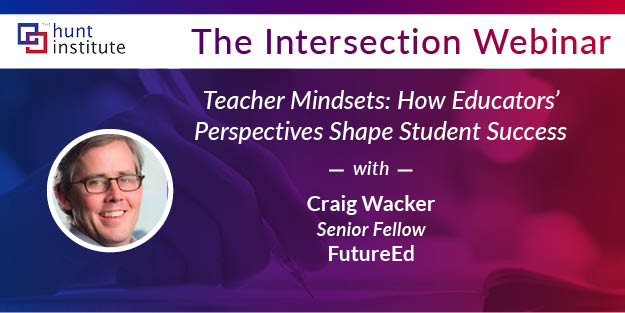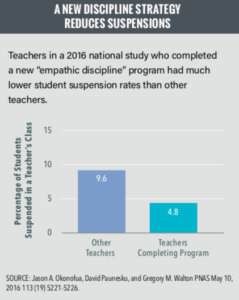
In recent years, increased focus on social and emotional learning has provided more thoughtful discussion on ways students can build these skills. Emerging research is expanding this focus to include the importance of teacher mindsets and their impact on how students view themselves as learners and their ability to achieve.
Teacher Mindsets: How Educators’ Perspectives Shape Student Success, a report recently released by FutureEd, details new findings on teacher mindsets and highlights schools at the forefront of efforts to tackle student motivation and achievement through altering teacher perceptions and biases.
One of the authors of this report, Craig Wacker, joined us in our latest Intersection Webinar to share these findings and discuss how teachers’ attitudes, beliefs, and behaviors about their students impact student motivation and learning, and the role this may play in efforts to support social emotional learning. Below are key takeaways and the full webinar recording.
Key Takeaways | Teacher Mindsets: How Educators’ Perspectives Shape Student Success
- Teachers, and their own mindsets, are the primary conduit through which students can develop their own growth mindset, a sense of belonging, and a feeling of purpose and relevance. The impact of each of these constructs on student achievement increases with strong staff-student relationships, especially for at-risk students.
- Through every interaction, teacher attitudes, beliefs, and practices impact student confidence, motivation, and achievement.
- For example, Craig referenced a study of postsecondary STEM courses in which students whose teacher championed a growth mindset saw significantly higher course grades, and a decrease in the achievement gap between white and underrepresented minority students.
- By providing students with critical feedback that connects to a positive message around teacher expectations and student ability, teachers can help students overcome the feeling that they don’t belong in school or cannot engage in learning.
- Students, especially African American students, were significantly more likely to revise an essay to improve their scores when given critical feedback that included a message of high expectations such as “I’m giving you these comments because I have very high expectations and know that you can reach them.”
- Promoting Empathetic Discipline trainings that allow teachers to relate to and empathize with students of color has shown the potential to reduce the use of punitive and exclusionary practices.
- Students whose math teachers completed Empathetic Discipline trainings were half as likely to be suspended over the course of the school year.

- To support teachers in developing these mindsets, the Expeditionary Learning (EL) Education model has been used to effectively support teachers in developing appropriate mindsets through “walk-through” rubrics. These informal observations allow school administrators to provide judgement-free feedback and impart best practices.
For our full conversation with Craig, watch the webinar below.

See you at The Intersection!
The Hunt Team



